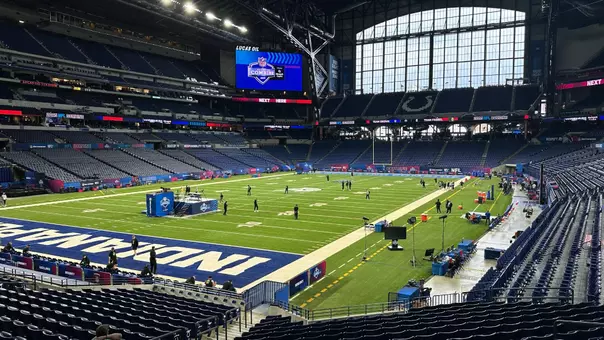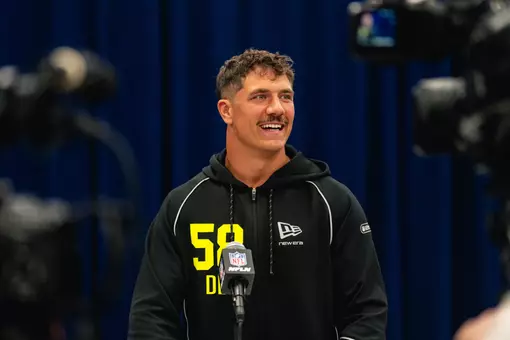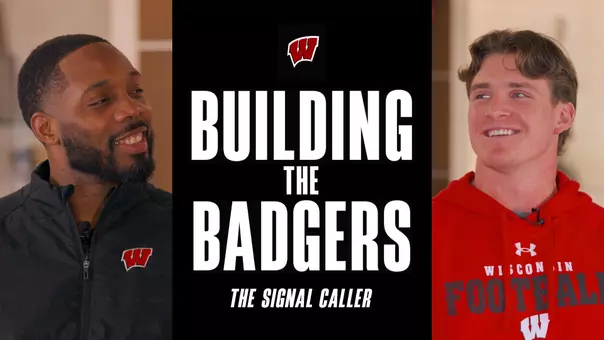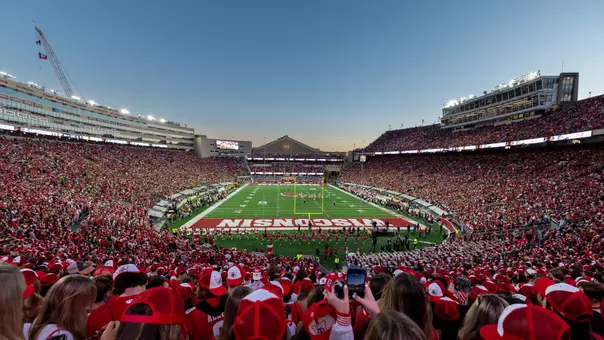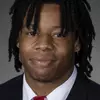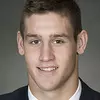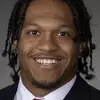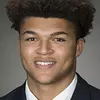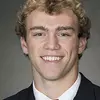
Lucas: Brown brings passion for the position – and players – to running backs room
March 24, 2021 | Football, Mike Lucas
Longtime NFL assistant brings track record of strong production, strong relationships to Wisconsin
 |
|
|
BY MIKE LUCAS
UWBadgers.com Senior Writer
MADISON, Wis. — Whether it was with Peyton Hillis or DeMarco Murray, Darren McFadden or Ezekiel Elliott, or any of the running backs that came under his coaching wing, Gary Brown has been conversant in the language of the position he played for eight years in the National Football League.
"I just have a passion for the position, I love the position," said Brown, who been named Wisconsin's running backs coach. "The first thing we're going to do is set a standard on what we're going to do and how we're going to do things and live up to that standard each and every day."
As an NFL assistant with the Cleveland Browns and Dallas Cowboys, Brown groomed four 1,000-yard rushers: Hillis (1,177 in 2010), Murray (1,121 in '13 and 1,845 in '14), McFadden (1,089 in '15) and Elliott, who averaged over 1,300 yards between '16 and '19 and twice led the league in rushing.
Brown built a particularly strong relationship with Elliott, the former Ohio State tailback.
"He understood that I cared about him as a person," Brown said. "With what he was going through off the field (a string of controversies), I was there for him as far as just being someone who would listen, someone that he could bounce stuff off, all those things.
"Players really don't care what you know or what you can teach them until they know that you care about them as people. It's such a big thing for me. I want them to understand that I'm not just here to use you for your abilities or use you to help me keep a job.
"Whatever that may be, I want them to understand that when our time is done, you can still call me, and you can still come to my house and we can still sit down and talk because I care about you as a person, and I care about your future."

This was not just coachspeak. At the end of the 2019 season in Dallas, with rumors circulating about the job status of head coach Jason Garrett, the "Sounds from the Sidelines" video series caught Brown talking on the bench with Elliott, Tony Pollard and Jamize Olawale.
"I don't know what's gonna to happen tomorrow," he told his RBs during the regular-season finale against Washington. "I don't know what they're gonna to do. I don't have a contract. But if they don't bring me back, man, it was a pleasure. I mean, you guys made my life better.
"You know what I'm saying? We'll see what happens. But I love each one of you guys like you're my sons. So whatever y'all need from me, let me know. You know what I'm saying? Whatever happens."
The following Sunday, Garrett was fired, and Brown was not retained.
This is a small window into the assistant the Badgers are getting. The 51-year-old Brown had never met UW head coach Paul Chryst prior to interviewing for the Badger running backs job vacated by longtime Chryst associate John Settle, who has moved on to the University of Kentucky.
A link between Brown and Chryst was Garrett, now the New York Giants offensive coordinator.
In 1991, Chryst was an offensive assistant coach with the San Antonio Riders of the World League of American Football and Garrett was the quarterback. Over the years, they stayed in touch and there were even conversations at points about Chryst potentially joining the Cowboys staff.
"What I had heard about Coach Chryst was nothing but positive things from the people who know him," said Brown, who was hired by Garrett in 2013. "Obviously with such a rich tradition of running backs, it really piqued my interest in trying to pursue this job."
The Badgers return tailback Jalen Berger, who was the team's leading rusher (60 carries for 301 yards) as a true freshman despite playing in only four of the seven games in 2020. Also returning are Isaac Guerendo, Julius Davis and Brady Schipper and fullbacks John Chenal and Quan Easterling.
"I got to talk with a few of them," Brown said. "And they all seem very smart, very attentive and very into what they want to get done as far as running backs are concerned. To be successful at that position, you have to be effective in all phases: running the ball, catching the ball, pass protection.
"I want us to be complete running backs. I want us to be dangerous with the ball in our hands when they hand it to us, and when they throw it to us."
Besides his 11 years as an NFL assistant, Brown had early coaching stints at D-III colleges in Pennsylvania (Lycoming College and Susquehanna University) before landing at Rutgers, where he spent one year (2008) on Greg Schiano's staff. His message has not changed at any of his stops.
"You have to be strong in all three of those phases," Brown reiterated of his running back profile, "and I don't think that changes with a rookie (in the NFL) or a freshman (in college). If a freshman comes in and he wants to play, he has to know how to protect the quarterback.
"Because at the end of the day, we have to keep him upright and make sure that he's protected. After that, we can see what you can do with the ball. But if we recruited you, and gave you a scholarship, you can run the ball."
Tailbacks Jackson Acker, Loyal Crawford and Antwan Roberts are in the 2021 freshmen class.
Brown is anxious to meet all his UW players. Anxious to get back to coaching, too.
Not long after losing his job with the Cowboys, he faced a real-life crisis. Again. The cancer had come back. In 2011, he had tumors removed and won a battle with kidney and colon cancer that had killed his father in 2006. Gary Brown won a second battle with the insidious disease in 2020.
"It was a situation where it was caught early and we took care of it and I'm moving forward," said Brown, who has not dwelled on his personal adversity. "What it has done is it has made me understand the importance of living life every day like it's your last day.
"Making the most out of every opportunity. Making the most out of every situation and looking at everything from the positive – look at it from a clear positive lens – because you just never know what life is going to give you from day to day.
"So, you'd better enjoy every day that you have. Enjoy the people around you. Enjoy your loved ones and have a smile on your face every day because none of this is promised tomorrow."
Brown has a daughter graduating from Penn State in May. She has dealt with leukemia.
"She's in remission," Brown said. "I'm very proud, very happy, she's about to start her life."

Penn State is Brown's alma mater. And his ex-teammates rallied behind him this past year.
"It was great, it was wonderful," he said of a supportive YouTube video and the outpouring of love from Sam Gash, O.J. McDuffie, Ki-Jana Carter, and so many others, including Garrett and members of his Cowboys family. "It just goes back to being blessed to have such great people in your life.
"Great people who want to see you do well, who want to see you fight this thing (cancer) and overcome it … With their blessings and well wishes, it helped me get through it."
In 1988, Brown, then a sophomore, led the Nittany Lions in rushing. The following season, he was moved to safety to fill a hole in the secondary. And he did so without complaint or drop-off in production, underlining his team-first mentality. As a senior, he returned to tailback.
"Basically, you have to be a team player first, you have to understand that it's not about the individual, it's about the team and what you can do to help the team get to goals," Brown said of his Penn State upbringing. "I've always tried to live up to that during my playing and coaching days."
In 1991, the Houston Oilers drafted Brown in the eighth round with the 214th selection overall. He played mainly on special teams his first two seasons before having his breakthrough year in 1993. Brown rushed for 1,002 yards (5.1 average) and six touchdowns. He also caught 21 passes for a couple of scores.
In a late November win over the Cleveland Brown, he ran for 194 yards.
It was the most by a Houston back since the iconic Earl Campbell ran for 203 in 1980.
"I was able to hit the ground running when my opportunity came," said Brown, who passed along a lot of the credit for his development to being in the Oilers huddle with three future Hall of Famers: quarterback Warren Moon and offensive linemen Bruce Matthews and Mike Munchak.
"I had an opportunity to learn under three Hall of Fame guys on what it was to be a pro, what it was to prepare every day, and what it was to put everything on the line for your teammates on Sundays. And to do it over and over and over again at a high level."
In 1997, after a year out of football, Brown reinvented himself with the San Diego Chargers and shared the backfield with Terrell Fletcher, the former UW tailback. "He kind of taught me a few things about the city and the offense," Brown said. "I just enjoyed watching him perform. I learned from him."
After one season with the Chargers, Brown signed as a free agent with the New York Giants in 1998 and rushed for 1,063 yards. Two years later, he retired from the NFL. It was just time.
"I just felt like I was at the age – as a 29-, 30-year-old running back – where you can't play forever," he explained. "I just had a daughter and I said, 'Let's go be a dad for a while.' That's pretty much what drove that decision. I never thought about coaching when I retired."
But then, Brown got a phone call from his former high school coach in Williamsport, Pa.
"He asked me to come and volunteer," he said. "I kind of fell in love with it (coaching) after that. I fell in love with the idea of teaching young running backs. I had all this knowledge I had gathered throughout the years and it was my opportunity to share that with somebody else."
By 2009, Brown had climbed the coaching ladder all the way to the NFL. As the running backs coach for the Cleveland Browns, he crossed paths with another former Badger – offensive tackle Joe Thomas, the Browns' first-round pick (No. 3 overall) in the 2007 draft.
"He was a pro's pro," Brown said. "There was nobody in the league at that time who was better than he was. He went about his business every day as a pro and those are the types of guys that you want to surround yourself with. I watched one of the best guys to ever play the position do it.
"And it seemed so effortless. But you knew the work that he put in to make him get to that point. Watching him play was another inspiration for me to be a better coach because I wanted my guys to be prepared and ready to go and to play and perform like he did."
In Dallas, Brown would be able to say the same things about another former UW offensive lineman, another pro's pro and another Hall of Famer-to-be in center Travis Frederick, who during his seven-year career helped open the holes for Murray and McFadden and Elliott with the Cowboys.
In retrospect, Brown was asked, what was the common thread in his running backs room?
"The desire to be great," he said of his core group. "They wanted to be among the elite at their position, so they'd perform that way during the week. They'd prepare. They'd study film. They'd do what was necessary. It was a thrill and an honor for me to coach those guys."
Given his NFL background, does it make him more relatable now to college running backs?
"I think it does – being that I played the position they played, and I played in the NFL," Brown said. "The reality is that a lot of guys have a desire to do that. I can relate to them and understand what they're going through and what's going on in their minds.
"I'll talk to them, encourage them and guide them in the right direction. That's going to be one of my strong points as far as coming to Wisconsin. Helping these young guys not only become better football players but better men, understanding what it takes to get to the level they want to be at."
Brown is anxious for spring practice. Anxious to embrace some form of normalcy, too.
"I'm hoping that I get a chance my first year to see the stadium filled, packed to the top," he said, picturing Camp Randall Stadium in the fall. "And I'm hoping we go out and win a whole ton of games. I'm really excited about getting back to coaching."

